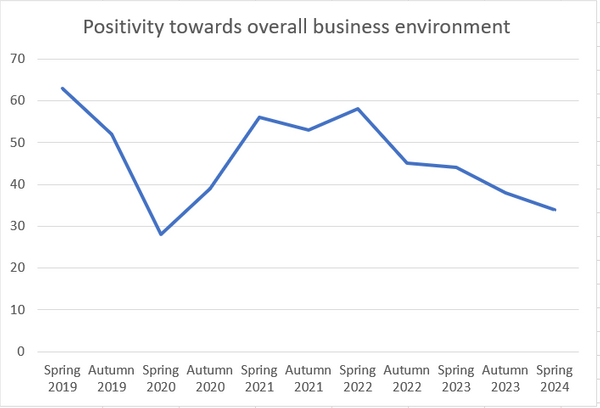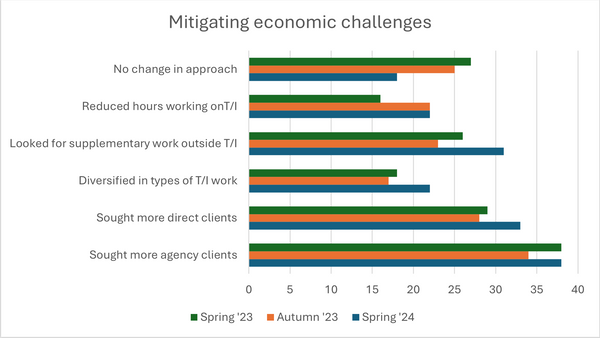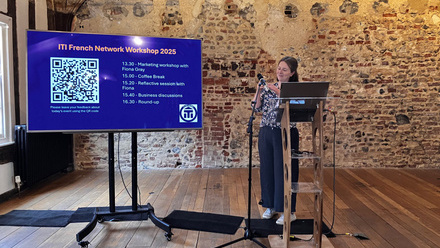Spring 2024 Pulse Survey results
Results from ITI’s latest Pulse Survey show that our members continue to find conditions challenging.
The most recent edition of ITI's twice-yearly survey of members reveals that positivity towards the business environment fell in Spring 2024, a trend we have seen for the last two years. 34% of respondents reported feeling either positive of very positive, compared to 38% six months ago and 58% two years ago.

55% of respondents have gained some new clients in the last 12 months (down from 58% in autumn 2023), with 5% having gained a significant amount (the same as previously). 9% have gained more work from existing clients (11% previously), while 49% reported that the amount of work coming from existing clients has decreased (vs 46% in autumn 2023) and a further 9% have lost existing clients (6% previously).
For the majority (52%), earnings per word / contract / hour have remained much the same over the past 12 months. The percentage seeing an improvement is the same as in the last survey (21%), but the number experiencing a reduction in rates has increased from 20% to 27%.

Given that clients’ purchasing choices are now harder to predict, partly due to the impact of technological change, it makes sense that members are continuing to look at ways to replace or boost income, with many having sought either new direct clients or agency clients. There has also been an increase in the number reporting that they are diversifying the types of translation and interpreting work being sought, up to 22%. This may demonstrate a pragmatic willingness to adapt in changing times, a response supported by the numbers; 31% of respondents say they have sought supplementary work outside of translation and interpreting.
Generative AI
We have recently begun to track attitudes towards generative AI and members’ feelings about its impact on their businesses. When asked about how well they feel they understand the impact generative AI is likely to have on the sector, respondents gave a weighted average of 3 out of 5, up from 2.8 in autumn 2023.
Members are clearly and understandably concerned about the potential impact of generative AI on future earnings, although the figures vary between interpreters and translators. 75% of interpreters are either slightly or moderately concerned and 25% either very or extremely concerned. Among translators, 55% are slightly or moderately concerned, 40% are either very or extremely concerned, while 5% are not at all concerned.
As we would expect, members are starting to experiment with the use of new technologies. 33% of interpreters already use AI tools in their workflow or to improve efficiency and a further 25% plan to do so in the near future, 17% are undecided and 25% are not planning to use them.
In comparison, 17% of translators are already using AI tools and a further 10% are planning to in the near future, while 35% are still undecided. However, 38% of translators say that they are not planning to use AI tools.
46% of respondents now offer machine translation post editing as a service and 19% offer post editing of AI generated texts.
Encouragingly, we have seen that there is an appetite to learn more about generative AI. The 10-week ‘Translation and AI’ course that ITI is delivering in conjunction with the Centre for Translation Studies has sold out twice over and is already receiving positive feedback.
The stream of AI-focussed presentations at the ITI Conference 2024 in Edinburgh was also well received, generating constructive and insightful discussions. We will make the recordings of selected presentations available to purchase through our online shop in due course.
So, although we cannot know what the future holds, we do believe that helping our members to learn about generative AI tools and how to use them, as well as offering business skills training to help members enhance and adapt their business will nurture resilience within our profession.






